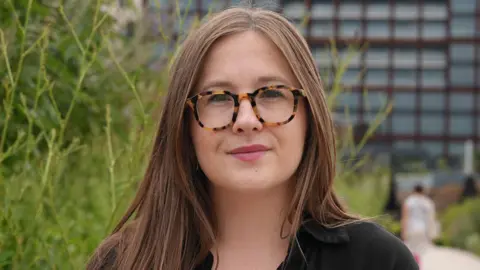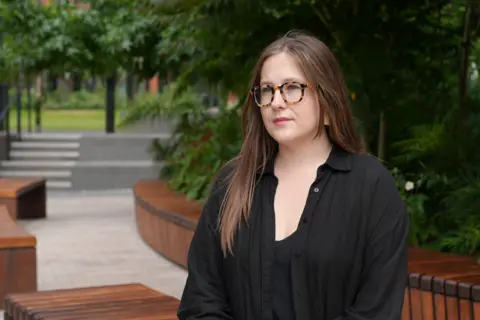
 BBC
BBC
A woman has received £35,000 in compensation after her rape case was dropped amid claims she could have had an episode of “sexsomnia”.
Jade Blue McCrossen-Nethercott, 32, contacted police in 2017, telling them she thought she had been raped while asleep. She said she had woke up half-naked, finding her necklace broken on the floor.
But charges were dropped by the Crown Prosecution Service (CPS) days before a trial was due to begin after lawyers for the alleged perpetrator claimed Jade had sexsomnia – a medically recognised, but rare, sleep disorder that causes a person to engage in sexual acts while asleep.
Jade has now received compensation from the CPS, which said it has “apologised unreservedly”.
It added that it was “committed to improving every aspect of how life-changing crimes like rape are dealt with”.
Jade said the CPS had “taken me to the darkest points of my life”, and that it felt “like a big triumph to be able to hold them accountable”.
Her lawyers, from the Centre for Women’s Justice, said it was “extremely rare” for the CPS to make a payout like this.
World turned ‘upside down’
In 2017, after a night out with friends, Jade woke up on a sofa with a feeling she had been raped while she slept. Within hours, she had reported it to the police. The suspect offered no comment when questioned and the CPS made the decision to charge him with rape.
But in 2020, just days before the trial was due to start, Jade was told by the CPS her rape case would not be taken to trial because the defence had claimed she had experienced an episode of sexsomnia.
The CPS explained that two sleep experts had given their opinion on the case after a police interview with Jade where she was questioned about her sleep habits. Neither expert had met or spoken to Jade.
Jade said she did not have sexsomnia, however, sleep experts were not able to rule out the possibility that she could have had an isolated episode on the night of the incident.
Despite never appearing before a jury, the defendant was formally acquitted, leaving the case unable to be reopened without compelling new evidence.
In 2021, Jade lodged an appeal via the CPS victim’s right to review system. In response, she received a letter of apology from a chief crown prosecutor, independent of the CPS department that made the original decision to close her case.
They admitted the CPS was wrong in closing her case, saying it should instead have been taken to trial.


Jade described the CPS decisions during this time as “more damaging” to her than the night of the incident, saying the legal process had turned her world “upside down”.
She said her decision to sue the CPS was motivated by wanting accountability and to ensure “similar mistakes [were] not made again in these kind of rape cases”.
“For me it’s not about the financial side of things. I’m very much wanting to push for systemic changes with the CPS and the legal system advocating for better training, policies, procedures and practices,” she said.
She added: “It has taken a lot from me, but I held on to a lot of positives. I am really proud of the work that both myself and the Centre for Women’s Justice have done to get to this point.”
Kate Ellis, joint litigation lead at the Centre for Women’s Justice, said claims brought by victims against the CPS are legally “difficult”, with payouts “extremely rare”.
She said Jade’s was the first case she was aware of in which a rape victim had been awarded compensation by the CPS over a decision to discontinue a case before trial.
“It’s a testament to how severe the failing was on the part of the CPS that we have been able to bring this claim,” she added.
In the year to March 2024, 65,913 rape cases were recorded by police in England and Wales (excluding Devon & Cornwall police). Of these cases, just 2.6% have so far resulted in a suspect being charged, or receiving a summons, according to Home Office figures.
A spokesperson for the CPS said: “A settlement has been reached with Ms McCrossen-Nethercott, to whom we have apologised unreservedly, and we continue to wish her the very best going forward.
“We remain positive about the progress being made and recognise there is still a long way to go to improve outcomes for victims, so more people can come forward and report with confidence.”
Jade said she was still waiting to hear from the CPS about the lessons it has learned from her case. She said she hoped her story would empower others to raise their voices.
“We must hold these agencies accountable and we’ve done it now,” she added.
If you have been affected by any of the issues raised in this article, help and advice can be found here










